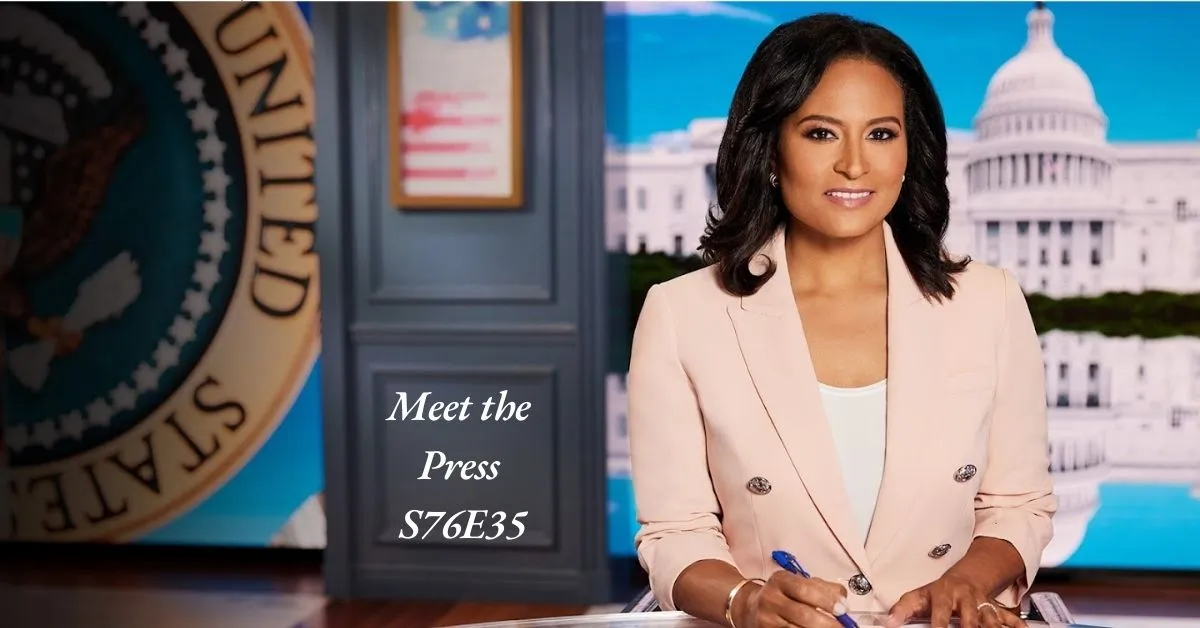Meet the Press S76E35: A Comprehensive Analysis of Political Discourse and Global Insights
“Meet the Press” holds a prestigious place in American journalism, boasting a legacy that dates back to 1947. As the longest-running program on network television, it has continually evolved, maintaining its status as a crucial platform for political discourse. Season 76, Episode 35 (S76E35) carries forward this rich tradition, offering viewers a nuanced analysis of the socio-political issues that shape our world today. Known for its hard-hitting interviews and in-depth discussions, the show once again brought together a distinguished panel of experts, politicians, and analysts to delve into topics ranging from domestic policy challenges to international relations.
This article offers an in-depth look at the key discussions from Meet the Press S76E35, breaking down the major themes, perspectives, and debates explored during the episode. From economic recovery to healthcare reform and social justice, we will analyze the significance of the issues discussed, the diverse viewpoints presented, and the potential long-term impacts.
The Historical Significance of “Meet the Press”
A Platform for Political Leaders
“Meet the Press” has earned its reputation as the premier political talk show in the United States. Over its 76 seasons, it has been the stage for countless presidents, policymakers, and public figures to directly address the American public. The program’s commitment to tough, fair interviews has made it a trusted source of information, allowing it to remain relevant in an ever-changing media landscape.
Historically, “Meet the Press” has played a pivotal role in shaping public discourse by providing a platform for politicians and experts to share their insights. Its impact on political reporting cannot be overstated, as it has set the standard for the level of depth and analysis expected from journalistic endeavors. The longevity of the program is a testament to its ability to adapt to the times while upholding its founding principles of transparency and accountability.
A Trusted Source for Political Discourse
S76E35 builds on this legacy, continuing to deliver on its promise of comprehensive political coverage. With its capacity to feature a broad range of topics—domestic policy, international relations, social justice, and economic challenges—the episode offered viewers much-needed perspectives on today’s most pressing issues.
Overview of Season 76, Episode 35
Navigating a Divided Landscape
Season 76, Episode 35 aired at a time when political tension and social upheaval were at a peak in the United States. As the country grappled with challenges such as economic recovery from the COVID-19 pandemic, ongoing political polarization, and shifting global dynamics, the episode’s discussions provided viewers with critical insights. Featuring a diverse panel of politicians, analysts, and experts, the episode explored key topics impacting the American socio-political climate.
From debates on healthcare reform and economic recovery to international relations and public health concerns, S76E35 was a microcosm of the complex issues shaping the national and global landscape. The episode skillfully wove together various perspectives, encouraging viewers to think critically about the challenges ahead and the potential solutions on the table.
Key Themes and Topics Discussed in Meet the Press S76E35
Domestic Policy and Governance: A Polarized Political Environment
The State of the Union: Legislative Challenges
The episode opened with a discussion on the state of the union and the challenges facing the current administration. With Congress divided and partisan gridlock increasingly common, the conversation centered on the administration’s efforts to enact crucial domestic policies, particularly in the areas of healthcare, infrastructure, and education. Panelists discussed how these efforts have been hampered by political polarization, making bipartisan cooperation more elusive than ever.
Despite these challenges, the discussion also highlighted areas of potential common ground. The need for healthcare reform, infrastructure development, and education policy improvements were widely recognized, but the question remained: Could these policies gain the necessary political support to become reality?
Healthcare Reform: Addressing the Challenges
Healthcare reform was a major topic in the episode. The U.S. healthcare system has long been a contentious issue, with ongoing debates over access, affordability, and the role of government. Panelists discussed various proposals, from expanding Medicare to creating a more inclusive, universal healthcare system. They weighed the benefits and challenges of such reforms, considering the economic implications, the impact on insurance companies, and the ongoing debate over the public vs. private healthcare models.
Panelists agreed that healthcare accessibility remains one of the most critical issues facing the American public. The episode explored the societal implications of these debates, including how healthcare access (or the lack thereof) directly impacts communities across the country, particularly marginalized groups.
Education Policy: Funding Disparities and the Impact of COVID-19
Education policy was another significant topic in S76E35. The conversation focused on the disparities in funding and resources across different school districts, exacerbated by the COVID-19 pandemic. The shift to remote learning posed significant challenges, particularly for underfunded schools, which faced difficulties in providing students with the necessary tools for online learning.
Discussions also explored long-term consequences for students and educators. How will the education system adapt in a post-pandemic world? Panelists emphasized the importance of equitable investment in education to ensure that all students have access to the resources they need to succeed.
Economic Challenges and Opportunities: Recovery in the Wake of COVID-19
The Economic Recovery: Government Stimulus and Growth
The episode turned to the economic recovery efforts following the COVID-19 pandemic. Panelists debated the effectiveness of government stimulus measures and their role in sparking economic recovery. Unemployment, inflation, and labor market dynamics were all examined in detail, with experts weighing in on how the government can best support individuals and businesses as they recover from the financial downturn.
Despite the challenges, panelists expressed cautious optimism about the potential for long-term economic growth. They discussed the prospects of a “stronger” recovery, one that could address income inequality and lay the foundation for future prosperity.
Infrastructure and Investment: Building for the Future
Another major focus of the episode was infrastructure investment. With calls for a new infrastructure bill circulating in Congress, the panel explored the potential benefits of investing in public works, including the creation of jobs and the modernization of vital infrastructure like roads, bridges, and the power grid.
Infrastructure development was seen as critical not only for economic recovery but for future competitiveness in the global marketplace. The panel emphasized the importance of securing long-term funding for such projects and the role of both public and private sector collaboration in making these investments a reality.
Tax Policy: Balancing Revenue and Economic Stimulation
The conversation also touched on tax policy, with experts analyzing recent proposals to reform the U.S. tax system. Discussions focused on finding a balance between revenue generation and stimulating economic growth, with panelists debating the merits of different tax structures. How can tax reform ensure fairness while fostering an environment that encourages business investment and job creation?
International Relations and Security: A Changing Global Landscape
U.S.-China Relations: Navigating Trade and Tensions
In the realm of international relations, U.S.-China relations were a key topic. As China continues to assert itself as a global economic power, the panel discussed the complexities of trade tensions, technological competition, and geopolitical conflicts between the two nations.
The conversation explored how the U.S. could navigate this increasingly tense relationship, balancing competition and cooperation. Panelists acknowledged the challenges of maintaining a strategic relationship with China while protecting U.S. interests in areas like intellectual property, trade agreements, and regional security.
Middle East Policy: Challenges of Stability
The episode also covered U.S. policy in the Middle East, with a focus on recent developments in Afghanistan and Syria. The U.S. withdrawal from Afghanistan left a significant power vacuum, leading to concerns about the future stability of the region.
Panelists discussed the broader implications of U.S. actions in the Middle East, including the importance of strategic alliances and partnerships in maintaining peace and security. With ongoing conflicts in Syria and tensions in Iraq, the episode underscored the challenges of achieving lasting stability in the region.
Cybersecurity Threats: Protecting National Security
In an era of increasing cyber threats, the episode addressed the growing importance of cybersecurity. Panelists discussed the vulnerabilities faced by both government institutions and private sectors in the face of cyberattacks. The conversation explored how the U.S. could strengthen its cyber defenses, protect critical infrastructure, and foster international cooperation to combat cybercrime.
Social Justice and Public Health: Pressing Domestic Issues
Racial and Social Justice: The Fight for Equality
Social justice issues took center stage in S76E35, with panelists discussing ongoing efforts to address racial inequality in America. Following the George Floyd protests and other movements advocating for racial equality and police reform, the episode explored the deeper societal impacts of systemic racism. Panelists called for comprehensive reforms to address these issues at both the local and national levels.
Public Health and the COVID-19 Pandemic: Moving Forward
The ongoing COVID-19 pandemic continued to be a central issue. Panelists assessed the current state of the pandemic, particularly the challenges surrounding vaccination efforts and the emergence of new variants. The conversation also touched on the lessons learned from the pandemic and how the U.S. can better prepare for future public health crises.
Mental Health: Addressing the Silent Crisis
The episode also included an important discussion on mental health awareness. The pandemic has had a profound impact on mental well-being, and the panel emphasized the need for better access to mental health services and reducing stigma. Mental health policy was framed as an integral part of broader healthcare reform, with calls for greater investment in mental health care infrastructure.
Conclusion
Season 76, Episode 35 of Meet the Press exemplified the program’s long-standing commitment to providing insightful, thoughtful, and comprehensive analysis on the key issues of the day. From economic recovery to international relations and social justice, the discussions on this episode reflected the complexities and interconnectedness of today’s global landscape.
As the political environment continues to evolve, Meet the Press remains a vital resource for understanding the pressing issues of our time. Through interviews, expert analysis, and informed debate, it fosters a deeper understanding of the political forces shaping the future.
By examining the multifaceted topics explored in this episode, viewers can better appreciate the challenges ahead and the critical decisions that lie at the heart of the ongoing American and global political narrative
FAQS
What is the main focus of Meet the Press S76E35?
The episode covers key political and economic issues, including healthcare reform, international relations, and social justice.
Who were the panelists featured in this episode?
The episode featured political leaders, analysts, and experts from various fields offering diverse perspectives.
How does Meet the Press contribute to political discourse?
It provides in-depth interviews and discussions, offering viewers critical insights into current political events.
What domestic issues were discussed in S76E35?
Key topics included healthcare reform, education policy, and the economic recovery post-COVID-19.
How does the episode address international relations?
The episode explores U.S.-China relations, Middle East stability, and cybersecurity threats.





